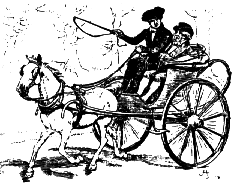 Having now a good house and very sufficient income,
he intended to marry; and in seeking a reconciliation with the Longbourn
family he had a wife in view, as he meant to choose one of the daughters,
if he found them as handsome and amiable as they were represented by common
report. This was his plan of amends- of atonement- for inheriting their
father's estate; and he thought it an excellent one, full of eligibility
and suitableness, and excessively generous and disinterested on his own
part. (p. 48)This paragraph suggests Mr. Collins' view of marriage.
Having now a good house and very sufficient income,
he intended to marry; and in seeking a reconciliation with the Longbourn
family he had a wife in view, as he meant to choose one of the daughters,
if he found them as handsome and amiable as they were represented by common
report. This was his plan of amends- of atonement- for inheriting their
father's estate; and he thought it an excellent one, full of eligibility
and suitableness, and excessively generous and disinterested on his own
part. (p. 48)This paragraph suggests Mr. Collins' view of marriage.
Love is not the major element in his marriage. He can marry a woman without the base of deep affection. He is confident that he can bring his future wife and her family an honorable and abundant life depending on his close relationship with Lady Catherine and her promotion. It is impossible to be rejected in his proposal. He is humble and over-polite on the surface but proud and arrogant actually. We know that he had particular purpose in each word and deed. It is the same in his marriage.
Previously, he tended to marry Jane, the eldest daughter of Mr. Bennet. If he did, he would feel less guilty to inherit Mr. Bennet's estate and be regarded as a generous man. He had an intention in marrying Jane. In addition, Jane was fit to his ideal wife with equal family standing, moral virtues and fair appearance. Lady Catherine must agree with him and like her, too. And this is another important factor in his choice. What a perfect decision it was! Unfortunately, Jane was going to be engaged soon. But it would be OK to Mr. Collins. He is not so determined in marrying Jane. As long as the woman was fit to his requirements, he would not be hesitated to propose her. He changed his mind so easily and soon. Elizabeth was his second choice because she was almost equal as Jane in appearance and birth. Through his inconstant change, we know that love was not important at all in his marriage. It was unnecessary to take too much time in comprehending his future wife. He made his mind to marry a woman quickly from Jane to Elizabeth to Charlotte. He was so shocked by Elizabeth's steadfast rejects towards his proposal. But he is not frustrated. He was still confident in his honor, his position and his fortune. This was her loss, not his. He still insisted on his view of marriage. Charlotte became his following choice owing to her hint of affection. Instead of being happy that he married a woman who he loved, Mr. Collins was satisfied with the benefit and honor that this match would bring.
The very first sentence of this novel is so right to be his belief of marriage.
"It's a truth universally acknowledged, that a single man in possession
of a good fortune, must be in want of a wife."
 Back
Back